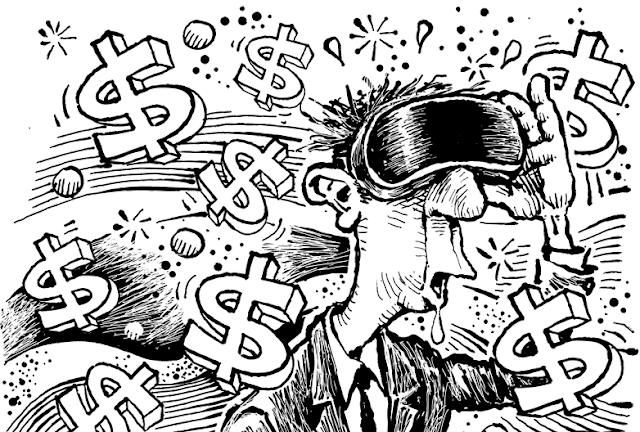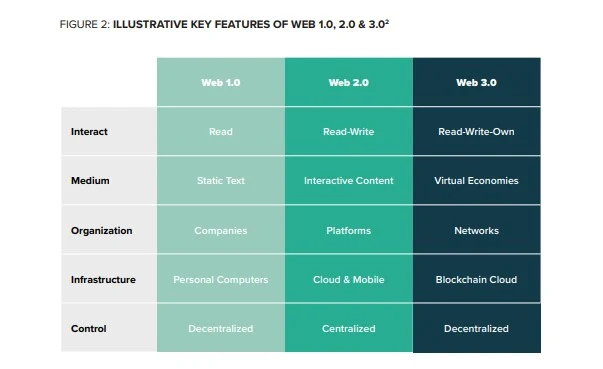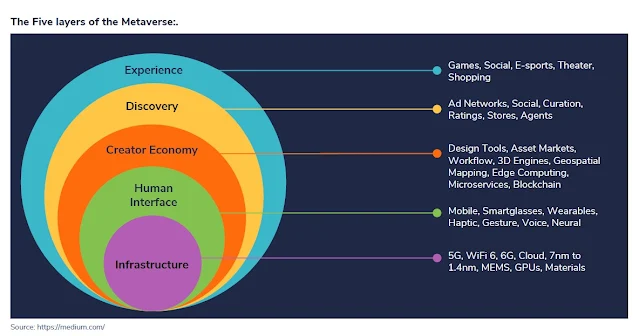The metaverse is the trendy concept, pushed by Facebook which has made it its new mission and even its identity. What are we talking about and how to invest in this concept?
At the end of October, Mark Zuckerberg announced the name change of Facebook's parent company to "Meta", directly referring to a gigantic project he intends to develop: the metaverse. Other major groups (Nike, Disney, etc.) also seem to be preparing for the same technological challenge.
What is it about? The Metaverse is a contraction of the words "meta" and "universe". For Zuckerberg, this is the "holy grail of social interactions." The idea is to generate more immersive virtual experiences, while remaining in touch with reality. Among the type of experience made possible by this three-dimensional universe: buying (real) clothes in virtual shops and picking them up in the real world, attending a (virtual) concert given by a (real) artist, etc. In this type of experience, virtual 3D and the real universe are therefore intrinsically linked. To access it, all you need to do is use a virtual reality headset and / or other technological interfaces.
But the metaverse is also a new dimension in the world of games with projects such as Decentraland where users can earn MANA (native token of Decentraland), buy land or virtual collectibles, vote on economic projects. and governance or even create NFTs (non-fungible tokens), giving them real interoperability for the value of their time spent in the game.
To laymen, the metaverse looks like an enhanced version of virtual reality (VR). But for many scholars, the metaverse may just be the future of the internet.
THE WEB 3.0
The Internet has always been used to connect people. But over the past three decades Internet technology has transformed and the way we interact with the web has evolved with it. Three key internet eras can be distinguished:
- Web 1.0 - Netscape connected us to the internet;
- Web 2.0 - Facebook and other social networks have connected us to online communities;
- Web 3.0 - The Metaverse will connect us to a virtual world now in the hands of the user community (instead of today's internet giants).
As the table below shows, the level of interaction, the mediums used, the organization, the internet infrastructure and the level of control exercised are changing.
The Web 2.0 mobile internet has changed the way we use and interact on the web. The Web 3.0 Metaverse has the potential to create an even deeper mutation.
The Opportunity Of The Metavers Market
It is estimated that the revenue generated by virtual games could increase from around $ 180 billion in 2020 to around $ 400 billion in 2025.
The continued evolution of game developer monetization is a key dynamic in this fund trend. Gamers are increasingly moving away from paid games and favoring free games, which developers monetize by selling players items, land, and more. in order to improve their level of play or social status within these virtual worlds.
One of the most important developments between Web 2.0 and Web 3.0 is the shift from closed metaverse companies (i.e. owned and controlled centrally by web giants) to open cryptographic metaverse (i.e. owned and democratically controlled by users ).
In a Web 2.0 universe, players cannot monetize their investments and efforts. Game developers do not allow players to trade items with other players and keep these worlds closed so players cannot transfer their virtual wealth to the real economy.
Web 3.0 open crypto metaverse networks address this problem by removing capital controls imposed on these virtual worlds by Web 2.0 platforms. This new paradigm allows users to own their digital assets as non-fungible tokens (NFTs), trade them with others in-game, and transport them to other digital experiences, creating a whole new internet economy that can be monetized and in the real world.
This "creative economy" is known as "Play to Earn".
Established Web 2.0 companies - such as Facebook - will therefore have to adapt their business models by opening up their ecosystems and removing some of their competitive advantages.
The metaverse represents a revenue opportunity of over $ 1 trillion in advertising, social commerce, digital events, hardware and developer / creator monetization (see graph below).
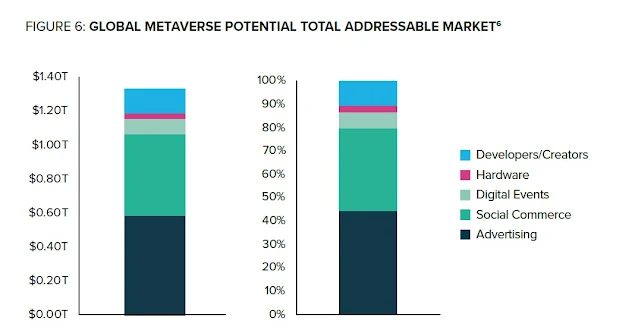
THE WEB 3.0 METAVERS ECONOMY
The first metaverse universes of Web 3.0 were generally built on the blockchain with a multitude of players contributing to the development of games while allowing these elements to be freely traded on the blockchain.
The most well-known examples of business activities today are:
- Art galleries, such as Sotheby's, allow owners to showcase and sell their NFT digital art at auction;
- Companies have established a digital headquarters in the metaverse allowing their employees to meet and collaborate.
- Digital billboards (advertising) in the metaverse;
- Concert halls in the metaverse where DJs and musicians play music and organize concerts.
These web 3.0 metaverse worlds are part of an interconnected crypto economy in the cloud. Decentralized protocols interact and provide the technical infrastructure necessary for the proper functioning of these virtual economies in the metaverse.
Capital investment in the sector has recently started to gain momentum. Companies like Facebook are planning to invest tens of billions of dollars in Metavers. But for many experts, this is only the beginning as the real idea of the metaverse may well take another 10 to 15 years to develop.
In a blog on medium, Jon Radoff highlighted the metaverse value chain by distinguishing 5 categories:
By dematerializing physical space, distance and objects, the metaverse will change our online experiences, particularly in games, social networks (possibility of socializing through virtual activities), e-sport, online shopping (clothing, real estate, etc.), “live” events around music, sport, etc.
Companies are active in this category: Alphabet, Amazon, Disney, Microsoft, Nike, Sea Ltd, Sony, Take-Two or even Tencent.
These are the features that allow users to have experiences at 2 levels: 1) those that support users looking for information about a specific experience (search engines, apps, influencers) ; 2) Marketing messages that do not necessarily correspond to a specific search (notifications, visual advertisements, etc.) Alphabet, Apple, Facebook (Meta) are exposed or will position themselves in this segment.
- The economics of creation:
This category includes all the technological tools that allow content creators to design the experiences that users seek. Today, some platforms such as Roblox already allow content creation without specific coding knowledge. The metaverse should allow this concept to be developed on a much larger scale through the use of specific tools such as geospatial mapping, 3D drawing, NFTs, etc. The relatively well-positioned listed companies are Autodesk, Dassault Systems, Matterport, Facebook (Meta Platforms), Nintendo, Roblox and Unity Software.
These are the tools and computer hardware (software and hardware) that make it possible to make the link between the virtual world and the real world and to establish connections between users. Think for example of 3D glasses, so-called “smart” audio equipment, connected watches, neurological implants, applications on smartphones, haptic devices, etc. This category includes large technology companies such as Amazon, Apple and Alphabet, Microsoft but also Meta Platforms (Facebook).
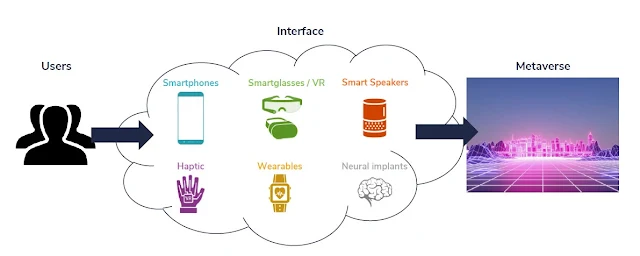
- The infrastructures necessary for the operation of the metaverse.
This category is relatively broad and includes semiconductors, 5G / Wifi, the "cloud" as well as data centers.
Semiconductor companies such as AMD, Nvidia, Qualcomm and TSMC are well placed on this theme. But there are also more "niche" players such as Digital Reality, Equinix or Global X Cybersecurity.
As the case in thematic investments, the selection of securities consists of a skillful mix between large caps (but whose exposure to the theme is necessarily diluted due to the diversification of their activities) and "pure" stocks. play ”, much more thematic but also more risky and more volatile.


